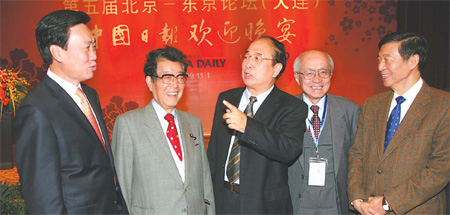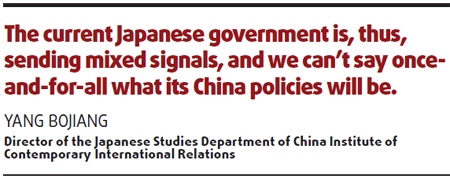China Perspective
Stronger Japan ties, but with riders
By Wu Jiao (China Daily)
Updated: 2009-11-02 09:46
|
 Zhao Qizheng (center), director of the Foreign Affairs Committee of the Chinese People's Political Consultative Conference, chats with Xia Deren (left), Party secretary of Dalian CPC Municipal Committee, Kozo Watanabe (second from left), senior consultant of the Democratic Party of Japan, Shinji Fukukawa (second from right), chairman of Machine Industry Memorial Foundation, and Wu Jianmin (right), honorary president of the Bureau of International Exhibitions at the welcome banquet hosted by China Daily for Beijing-Tokyo Forum (Dalian) last night in Dalian. [Zhang Wei/China Daily] |
The Democratic Party of Japan (DPJ)-led government will seek to enhance cooperation with China in the wake of its "return to Asia" policy, experts said ahead of the annual Beijing-Tokyo Forum, which begins today.
Yet, in a subtle shift from past differences between the two Asian neighbors, irritants relating to human rights and the promotion of democracy, which are pet DPJ subjects, are likely to cause some friction in the days ahead, they pointed out.

The existence of several factions within the Yukio Hatoyama-led DPJ, which ousted its conservative rival, the Liberal Democratic Party, in the August elections, adds an element of uncertainty to the smooth implementation of its China policy, the experts said, ahead of the conference in Dalian, Liaoning province.
The Hatoyama government, in a move away from the foreign policy pursued by the long-dominant Liberal Democratic Party, which emphasized on the Japan-US alliance at the expense of good neighborly relations, has said it would focus more on building strong relationships with its Asian neighbors, particularly with China.
A foreign policy report delivered by Hatoyama during his first policy speech last week, in fact, vowed to steer a more independent diplomatic course from its long-time security ally.
The two friends have of late run into rows, including a dispute over the relocation of the Futenma air base on Japan's southern island of Okinawa.
The policy report also stressed the urgency of solving the Democratic People's Republic of Korea nuclear issue, followed by a neighborhood policy that seeks to "tolerate diverse social values and build up mutual trust" with the Republic of Korea and China.
"The report reflects that the current Japanese administration is pragmatic and aims to solve pressing issues. It shows that they think there are no major concerns with China at the moment," said Yang Bojiang, director of the Japanese Studies Department of the China Institute of Contemporary International Relations.
However, given the fact that the DPJ has long focused on issues of a more practical nature, the major bilateral sore points might move on from historical differences to so-called democracy and human rights issues, Yang warned.
Historical issues, especially relating to the Japanese aggression in Asia, have often strained relations between earlier Japanese governments and China. The current DPJ government, however, has said it is "courageous enough to face up to history".
But, its insistence on placing human rights issues centerstage has already led to a row over the issuing of a visa to Rebiya Kadeer, a sensitive political figure that China sees as the mastermind behind the deadly July 5 Xinjiang riots.
The Dalai Lama, who has the strong backing of Hatoyama but whom China names as the chief instigator of a series of violent incidents aimed at sabotaging the country and last year's Olympics, is also now visiting Japan.
| |||||||
Yang also warned that the faction-ridden DPJ would complicate the foreign policy stance further.
The party now has members both from the far left and far right wings, as well as from the younger generation and older ones.
Even if DPJ remains in power for its full-term, it is unclear whether the party would retain Hatoyama at the helm for the entire period, Yang pointed out.
"Japan's China policy may also shift with any likely leadership changes," he said.
However, "as Japan will advance its "return to Asia" policy to drag itself out of the economic and political morass, the DPJ government would be more keen now to cooperate with China and other Asian neighbors," said Yang.
Japan is no longer likely to target only the US as its most important economic market, "if you look at all the trade statistics, investment, and the movement of people", said Hitoshi Tanaka, a former senior Japanese diplomat who advises DPJ lawmakers.
"We have to survive as a prosperous nation and, for that, we need East Asia to become a much more vibrant place," Tanaka told Reuters.
Other experts too noted that the Hatoyama government did not envisage any other major bilateral concerns with China that needed urgent resolution.
Yukiko Fukagawa, a professor at the School of Political Sciences and Economics at Waseda University, said the Chinese and Japanese economies were complementary in nature and have huge potential.
"We should also cooperate in other fields, including politics, and in coordinated efforts to combat pandemics and climate change," Fukagawa said.












